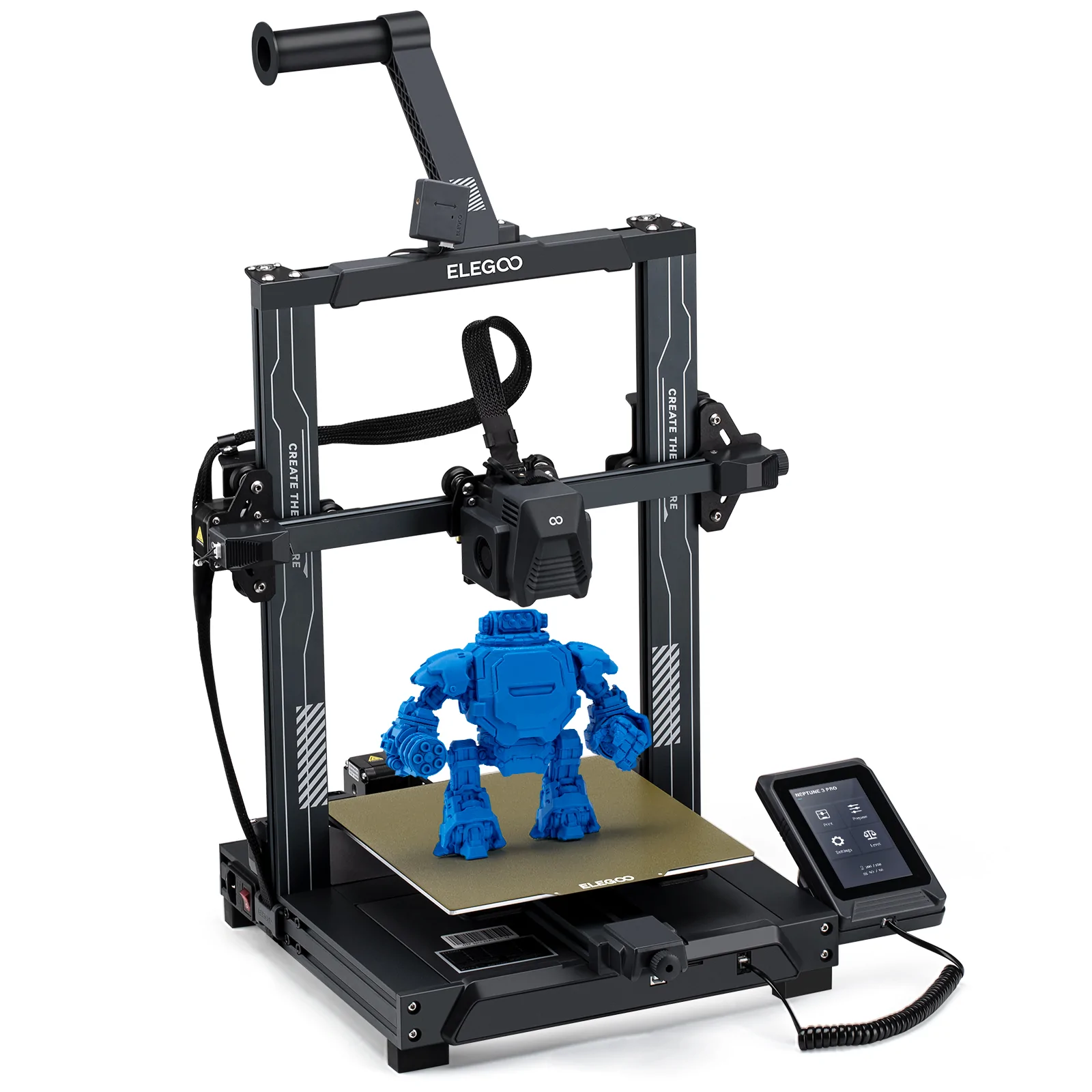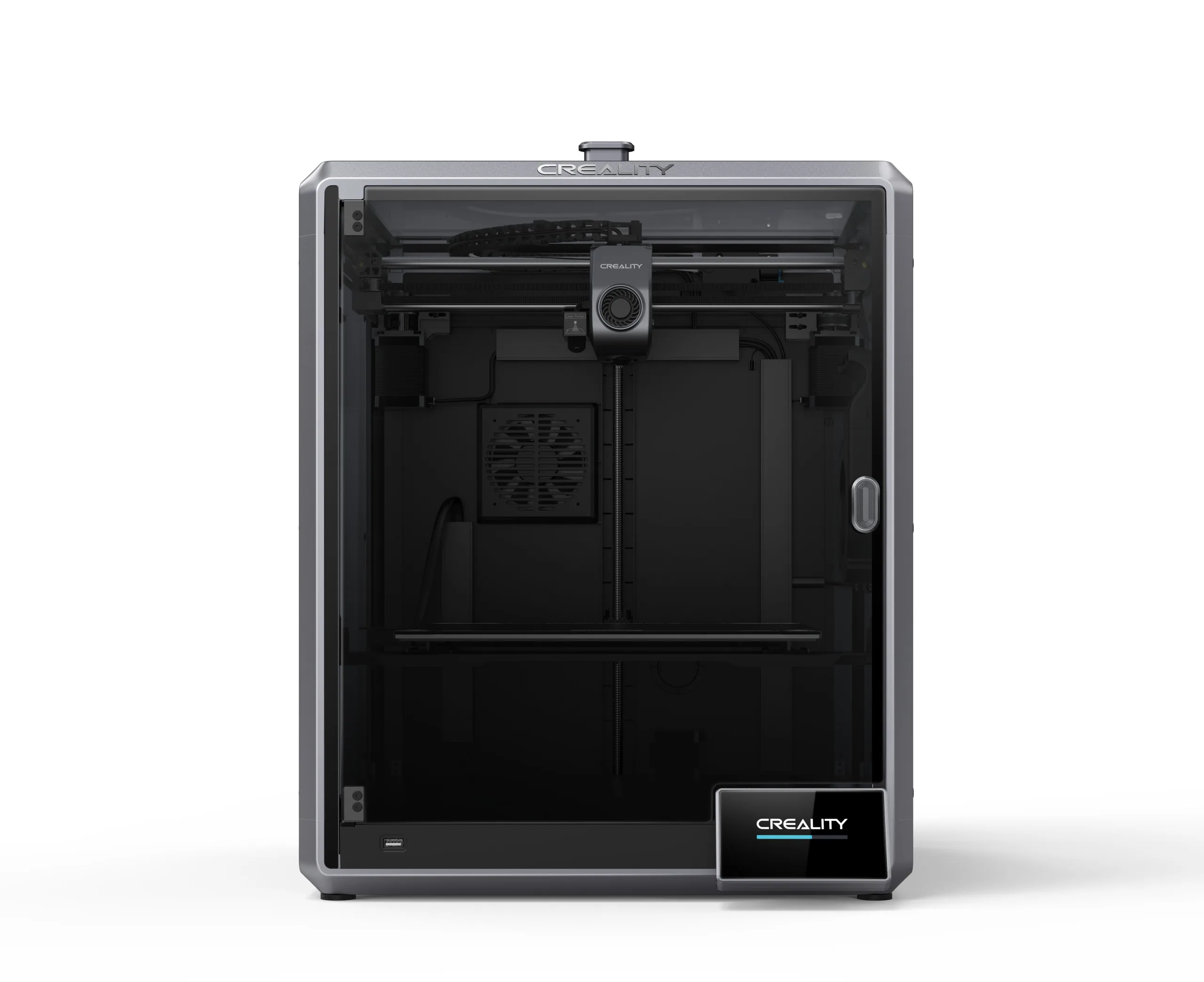Compare Neptune 3 PRO vs K1 Max
Comparison between the best 3D printers
Choose the best 3D printer at the best price. The cheapest 3D printers are here.
Buy a 3D printer here with 3D Fila.
 |
 |
|
| Model | Neptune 3 PRO |
K1 Max[BUY K1 Max] |
| Printing Material | Filament | Filament |
| Buy Filament for Elegoo Neptune 3 PRO | Buy Filament forCreality 3D K1 Max | |
| Estimated price | $230,00 | $1300,00 |
| Manufacturer | Elegoo | Creality 3D |
| Release Year | 2022 | 2023 |
| Print Volume [mm] | 225x225x280 | 300x300x300 |
| Printer Size [mm] | 445x515x475 | 435x462x526 |
| Weight [kg] | 8,1 | 18 |
| Power Loss Recovery | YES | YES |
| Enclosed printer | NO | YES |
| Bed Leveling | Automatic | Automatic |
| Filament End Sensor | YES | YES |
| Bed type | Heated | Heated |
| Power supply system | Direct Drive | Direct Drive |
| Standard nozzle | 0,4 | 0,4 |
| Maximum Nozzle Temperature [°C] | 260 | 300 |
| Maximum Bed Temperature [°C] | 100 | 100 |
| Maximum printing speed [mm/s] | 80 | 600 |
| Filament holder | YES | YES |
| Camera for supervision | NO | NO |
| Recommended filaments | PLA, PETG, Tritan, Flex, ABS | ABS, PLA, PETG, TPU, PA, ASA, PC, PLA-CF, PA-CF, PET-CF |
| Recommended slicers | Cura, Simplify, Slic3r, IdeaMaker e outros | Creality Print, Cura, Simplify, Slic3r, IdeaMaker e outros |
| Maximum Resolution [mm] | 0,1 | 0,1 |
| Processor | ||
| Display | Display touchscreen 4,3'' | Display touchscreen 4,3'' |
| Power Supply | 250 | |
| Connectivity | USB / Wi-Fi / Ethernet | |
| Operating systems | Windows, Mac, Linux | Windows, Mac, Linux |
| Date of registration in the system | 2023-03-02 | 2023-12-01 |
| Release date | 2022 | 2023 |
| Extra features | The Elegoo Neptune 3 Pro printer stands out for its easy assembly and automatic bed leveling, ideal for different levels of users. Equipped with a direct-drive extruder and dual gears, it offers excellent adhesion to slippery materials such as TPU. It incorporates dual screws on the Z-axis, ensuring stable prints, and features an integrated task light for improved visibility. With a PEI-coated build plate and a detachable touchscreen, it combines functionality and convenience. The printer also features an efficient cooling system, filament sensor and a simplified user interface. | The Creality K1 Max stands out as a fast Core XY 3D printer with a large build volume of 300 x 300 x 300 mm. It is fully enclosed and equipped with AI sensors to prevent print failures. This model has a smooth and flexible PEI build platform, and uses an automatic leveling system with LIDAR, as well as a filament run-out sensor. LAN, Creality Cloud and USB Flash Disk connectivity are available, as well as a 4.3-inch touchscreen interface. The K1 Max is robust, weighing in at 18 kg, and includes an AI camera and limited version of the Klipper firmware. Its motion system is solid and the printer is efficient with high-temperature filaments, but it is not silent. Assembly is 99% complete, requiring only minor adjustments before use. |
| Support for multiple colors and materials (AMS and CFS) | NO | NO |
Notes * |
||
| Cost-benefit | 6 / 10 | 7 / 10 |
| Hardware | 2.4 / 10 | 4.2 / 10 |
| Tela | . | . |
| Print volume | 3 / 10 | 4 / 10 |
| Performance | 0 / 10 | 5 / 10 |
| [BUY K1 Max] |
Conclusion |
| In conclusion, when comparing the Elegoo Neptune 3 PRO and the Creality K1 Max, the choice ultimately depends on the user's priorities and budget. The Neptune 3 PRO is a more affordable option, offering good features like automatic bed leveling, a reliable power loss recovery system, and a heated bed, making it a solid choice for hobbyists and those new to 3D printing. Its compact design and lighter weight also enhance its appeal for users with limited space. On the other hand, the K1 Max, with its significantly larger print volume, advanced features such as an enclosed design and AI sensors, is tailored for users who require higher performance and versatility. Its higher printing speeds and ability to handle a more extensive range of advanced filaments make it a compelling choice for professionals or those looking to push the boundaries of 3D printing. While the K1 Max carries a higher price tag, it offers substantial upgrades in performance, build volume, and advanced technology that may justify the investment for serious users. Conversely, the Neptune 3 PRO delivers excellent value for casual users and beginners. Overall, the decision hinges on specific printing needs, experience level, and budget constraints. |

